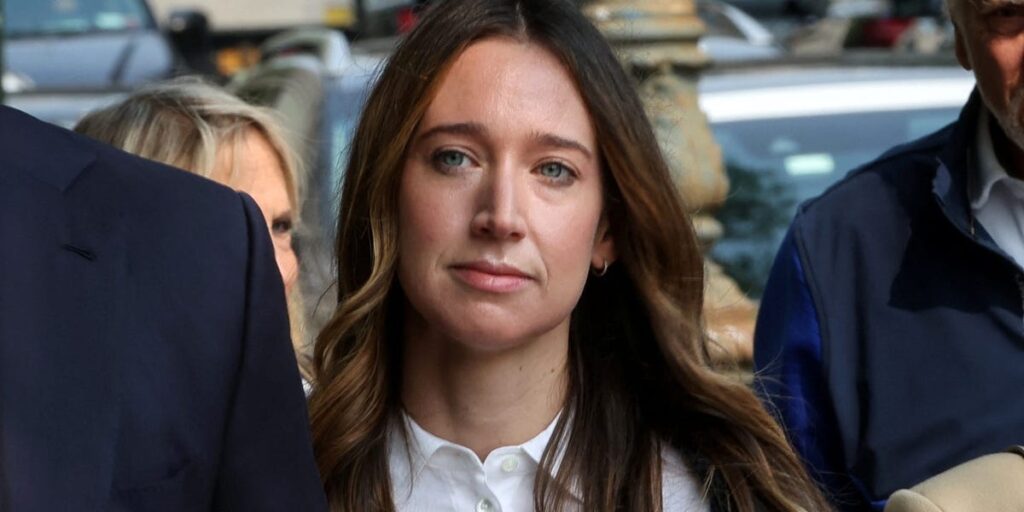Charlie Javice, the fintech entrepreneur convicted of defrauding JPMorgan Chase, got bad news from her New York judge — she must show up for a sentencing scheduled for Monday despite her request for more time.
Defense lawyers had told the judge and prosecutors that Javice could not safely fly to New York due to health concerns that remain redacted from the public record. She had asked for what prosecutors opposed as an unspecified, “lengthy” delay.
“Application denied,” her judge wrote in Thursday night’s tersely worded final denial.
The judge cited “reasons given in my prior order” from Monday, when he initially denied a sentencing delay and asked that Javice’s lawyers submit “evidence that travel is likely to be injurious.”
Javice’s lawyers did supply more evidence: a two-page letter that was completely redacted when it hit the public docket hours later — with no indication of who, even, had written it.
In Thursday night’s final denial, US District Judge Alvin K. Hellerstein said he remained unconvinced that Javice, who lives in the Miami area, was unable to fly safely to his Manhattan courtroom.
There remained “insufficient showing of harm from a one-day appearance at sentencing,” he wrote.
It was her second request for a delay; the first was not opposed by prosecutors.
Javice, 33, who once graced the Forbes 30 Under 30 list, faces a serious federal prison sentence on Monday.
Prosecutors have asked that she serve 12 years for tricking the biggest US bank into paying $175 million for Frank, her student financial aid website.
Javice used a bogus spreadsheet to claim her website had gathered contact data for 4 million high school students and recent graduates.
But Javice only had data for some 300,000 students, something JPMorgan Chase discovered only after the sale, when the bank tried to use the data to pitch bank accounts and credit cards.
Javice had insisted the bank purchase Frank without actually seeing her spreadsheet, saying its data was proprietary, according to trial testimony.
Chase officials agreed to let an independent contractor look at the spreadsheet to verify that it held the email and phone contact information — and in some cases financial data — for 4,265,085 young people who had used Frank to begin filling out a FAFSA, or Free Application for Federal Student Aid.
The contractor confirmed the spreadsheet contained 4.26 million rows, but was not asked to confirm that the data in the rows was legitimate.
Javice cited her fertility struggles, her Holocaust-surviving grandmother, and a lifelong commitment to charity in asking for no jail and no restitution in a nearly 300-page pre-sentencing filing earlier this month.
In her own letter to the judge, she said she takes “full responsibility.”
“I accept the jury’s verdict and take full responsibility for my actions,” she said in a three-page letter to Hellerstein, who presided over her March trial.
“There are no excuses, only regret — I am truly sorry,” she wrote.
Shortly after Thursday night’s bad news, lawyers for Javice filed a 24-page request that the judge allow her to remain free on her current $2 million bail pending their planned appeal of the verdict.
“Ms. Javice is neither a flight risk nor a danger” to the community, they wrote.
Her lawyers also said Javice’s appeal will be a strong one, and will argue that she may have been deprived of a fair trial because her jury was also asked to decide the guilt of co-defendant Olivier Amar, her second-in-command at Frank.
Amar, who is due to be sentenced on October 20, had argued at trial that Javice had deceived him just as she had deceived JPMorgan Chase.
“Amar set out to prove his innocence by proving Ms. Javice’s guilt,” telling the jury that she hid from him the full extent of the fraud, her lawyers wrote, arguing that the two co-defendants should have had separate trials.
“Ms. Javice was forced to go to trial against two prosecutors,” Amar and the government, they argued.
Thursday night’s request for continued bail additionally argued that an appellate panel may find that the judge erred in not letting Javice show the jury certain pages from the Frank website.
At the time of the 2021 sale, the website included a Frequently Asked Questions section and “Newsroom” pages “boasting that Frank had helped no more than several hundred thousand students, not the several million JPMC supposedly believed,” her lawyers wrote.
“JPMC was buying a website for $175 million,” they wrote.
“Its 350-person due diligence team scrutinized the deal for a month. The statements in question were not buried in the back of the website: they were on the ‘FAQ’ page and the “Newsroom” page,” they wrote.
Allowing the jury to see these pages “would have provided ample reason for the jury to doubt the government’s case,” they argued.
An attorney for Javice did not immediately respond to a request for comment left after business hours Thursday night.
The judge did not immediately decide if Javice can remain free pending appeal, a matter typically settled at the sentencing hearing itself, after additional arguments by prosecutors.
Read the full article here


